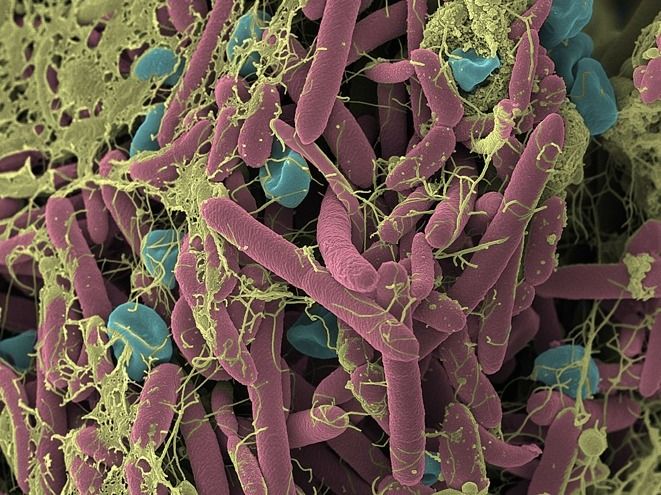Endogenous Infection Marker Guides Antibiotic Therapy
The endogenous infection marker procalcitonin can help to guide the use of antibiotics when treating infections. The course of antibiotic therapy is shortened, and its side effects and mortality rate also decrease, as researchers from the University of Basel and other colleagues report in the journal The Lancet Infectious Diseases. They conducted a meta-analysis of over 6,700 international data sets from patients with respiratory infections.
Procalcitonin is the precursor of a thyroid hormone that is undetectable or barely detectable in healthy people. If a bacterial inflammation occurs in the body, however, procalcitonin in the blood suddenly increases. This mechanism can be used by medical experts in the diagnosis of infectious diseases, as antibiotic treatment is only useful for bacterial infections. This is an important factor in respiratory infections, since distinguishing between bacterial and viral infections is often difficult in these cases.
It is already known that using procalcitonin can reduce antibiotic therapy by around 30%. In various randomized trials – including at the University of Basel – the attending physician was advised whether antibiotics were necessary or whether they could be stopped, based on the procalcitonin value. This strategy using the biomarker was then compared with a control group that decided on antibiotic use based solely on clinical criteria.
Working against resistance formation
A new meta-analysis led by Professor Philipp Schuetz from the Department of Clinical Research at the University of Basel, the University Hospital Basel and the cantonal hospital of Aarau has now shown that mortality in patients with respiratory infections decreases when treatment is guided by the infection marker procalcitonin. After 30 days, there was a 14% reduction in relative mortality (from 10% to 8.6%) and a 25% reduction in antibiotic side effects (from 22.1% to 16.3%).
“These results also give us hope that the global trend of antibiotic resistance formation can be countered,” comments Schuetz. Twenty-six research groups from 12 countries made the data of 6,708 patients available for analysis – in keeping with the global trend of data sharing, which allows individual patient groups to be better characterized.
Original publication
Most read news
Original publication
Philipp Schuetz, Yannick Wirz, Ramon Sager et al.; "Effect of procalcitonin-guided antibiotic treatment on mortality in acute respiratory infections: A patient level meta-analysis"; The Lancet Infectious Diseases; 2017, Available online 13 October 2017
Topics
Organizations
Other news from the department science

Get the life science industry in your inbox
By submitting this form you agree that LUMITOS AG will send you the newsletter(s) selected above by email. Your data will not be passed on to third parties. Your data will be stored and processed in accordance with our data protection regulations. LUMITOS may contact you by email for the purpose of advertising or market and opinion surveys. You can revoke your consent at any time without giving reasons to LUMITOS AG, Ernst-Augustin-Str. 2, 12489 Berlin, Germany or by e-mail at revoke@lumitos.com with effect for the future. In addition, each email contains a link to unsubscribe from the corresponding newsletter.
Most read news
More news from our other portals
Last viewed contents

Plastic bags that cannot breathe - Optimized enzyme variant can degrade plastic under anaerobic conditions

Loving the sweet enemy - Foods rich in fats and carbohydrates stimulate the reward system in the brain particularly strong

First-in-class immunotherapies for the treatment of cancer and autoimmune diseases - ImmunOs Therapeutics Raises $74 Million Series B Financing Round
BioMed X and Boehringer Ingelheim start new joint research group
Nobilon advances first vaccine into human trials - Intranasal influenza vaccine begins Phase I clinical development
Raptor Pharmaceuticals and TorreyPines Therapeutics Receive Stockholder Approvals to Merge - Merger to Create NASDAQ-Listed Biopharmaceutical Company named Raptor Pharmaceutical Corp.

Nobel Prize for Physiology or Medicine 2020 Announced - Nobel Prize awarded to Harvey J. Alter, Michael Houghton and Charles M. Rice for the discovery of Hepatitis C virus
PharmAthene and SIGA Technologies sign definitive merger agreement
PerkinElmer announces third quarter results - GAAP Revenue of $548 million versus $563 million in the comparable prior period

Glox Therapeutics Secures £4.3M Seed Funding to Develop Precision Antimicrobials Targeting Drug-resistant Bacteria - Spin-out from the Universities of Glasgow and Oxford

Doped by food - Dopamine release regulates our eating behaviour






















































